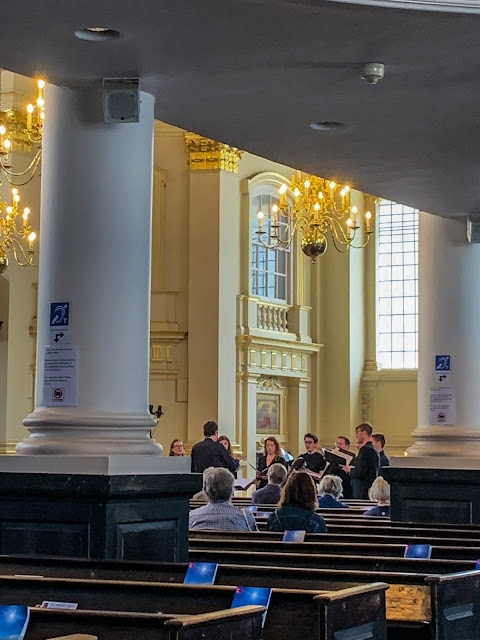After yesterday, I was all set to once again see a couple of plays. But John, strangely enough, felt like he did not want to see more than one play today. Instead, perhaps because it was a pleasant, sunny day, he wanted to go out to Hampstead. For any of you who are not regulars to London, Hampstead is one of the wealthiest section of the city. It just a plain little village for centuries, but after the plague of 1665 and the Great Fire of 1666 wealthy Londoners began to move here to be out of, yet close to, the city. A few decades later, a doctor claimed healing powers for a spring there and it became a fashionable spa town. By the late nineteenth century, after a rail line linked it it with central London, it became the affluent suburban community it remains.
Yet it has also been one of those affluent suburbs that has always appealed to an arty, literary crowd. It seemed like just about every other house had one of those London County Council historical markers.
Just to the north of the center of Hampstead lies Hampstead Heath. A heath, I learned from doing a little research, is a shrub land area with sandy, acidic soils. Some heaths occur naturally, while others are the result of human activities such as cutting forests for grazing land. I am not sure which kind of heath Hampstead Heath is. References to Hampstead Heath occur as far back as the Domesday Book, and at one time the monks of Westminster Abbey owned the rights to the land.
Today it is a large public park, though there are portions of it that are in private hands. John and I were not up to exploring every part of the park. We just wandered through a bit of it and found ourselves, completely by accident, in Hidden Hill Gardens. These gardens, dominated by a huge pergola, were once part of the estate of Inverforth House, but are now in public hands.






The gardens were originally built when Inverforth House was owned by William Lever, a poor boy from Manchester who made a fortune selling soap. He discovered a way to make soap more cheaply and effectively by using vegetable oil instead of beef tallow. With his brother James he established Lever Brothers, the manufacturer of, among other products, "Lux Toilet Soap." In the 1930s, Lever Brothers sponsored a weekly show where current movies were turned into radio dramas. It was called "Lux Radio Theater" and John loves to listen to episodes of it - there's about 800 of them on YouTube - as he falls asleep each night. Isn't it amazing how things connect?
In the garden, I snapped a picture of a robin. The European Robin is a completely different bird from the larger American bird of the same name. And I think they are much cuter.
After spending a good bit of time trying to figure out a way to get out of Hidden Hill Gardens without going back the way we had entered, John and I made it to North End Way, one of the streets that run through Hampstead Heath. We saw The Old Bull and Bush Tavern, a public house that proudly announced it dated back to 1721.
It had an outdoor patio, and we were hungry. Lunch was in order, and, I am pleased to say, it was quite a good one. Afterwards, we did not feel like walking back to the Underground station on the high street, so we took an Uber back to Leicester Square.
In the evening we went to see the Aaron Sorkin version of To Kill a Mockingbird. Late summer is not the best time to go to London to see theater. Most of what is on at this point are the big musicals that have been running for decades like Les Miserable, Lion King, or Phantom. We had no desire to revisit any of those and what was new largely seemed pretty lame. We thought about the revival of Anything Goes, but Sutton Foster had left the production and I know just about every line of that play. So, we settled on Mockingbird.
This version of the story follows Harper Lee's story fairly closely, but the dialogue and the sensibility are distinctly those of Sorkin. I have never been a fan of his work - I found The West Wing intolerably smug and irritating - and this play did not turn me into an admirer. He casts adult actors in the roles of the children. According to the reviews I read, this was supposedly because they were reflecting on the events from a later time in their lives. I did not particularly see that.
Atticus had to be made less of a hero here, particularly after the publication of Go Set a Watchman.
And the Ewalls, not particularly likeable in the book, have to be made even more vile because in Sorkin's imagination they are the incarnation of the Trump voter. I am not sorry I went to see the play, but like so much contemporary drama it had a preachy quality about it that is the antithesis of art to me.
It was late when the play was finally done. John and I wandered down Old Compton Street for a while being jostled by the crowds. We finally stopped at a Japanese robata joint on Wardour Street.

Tomorrow we leave London to visit our friends in Hampshire.






















